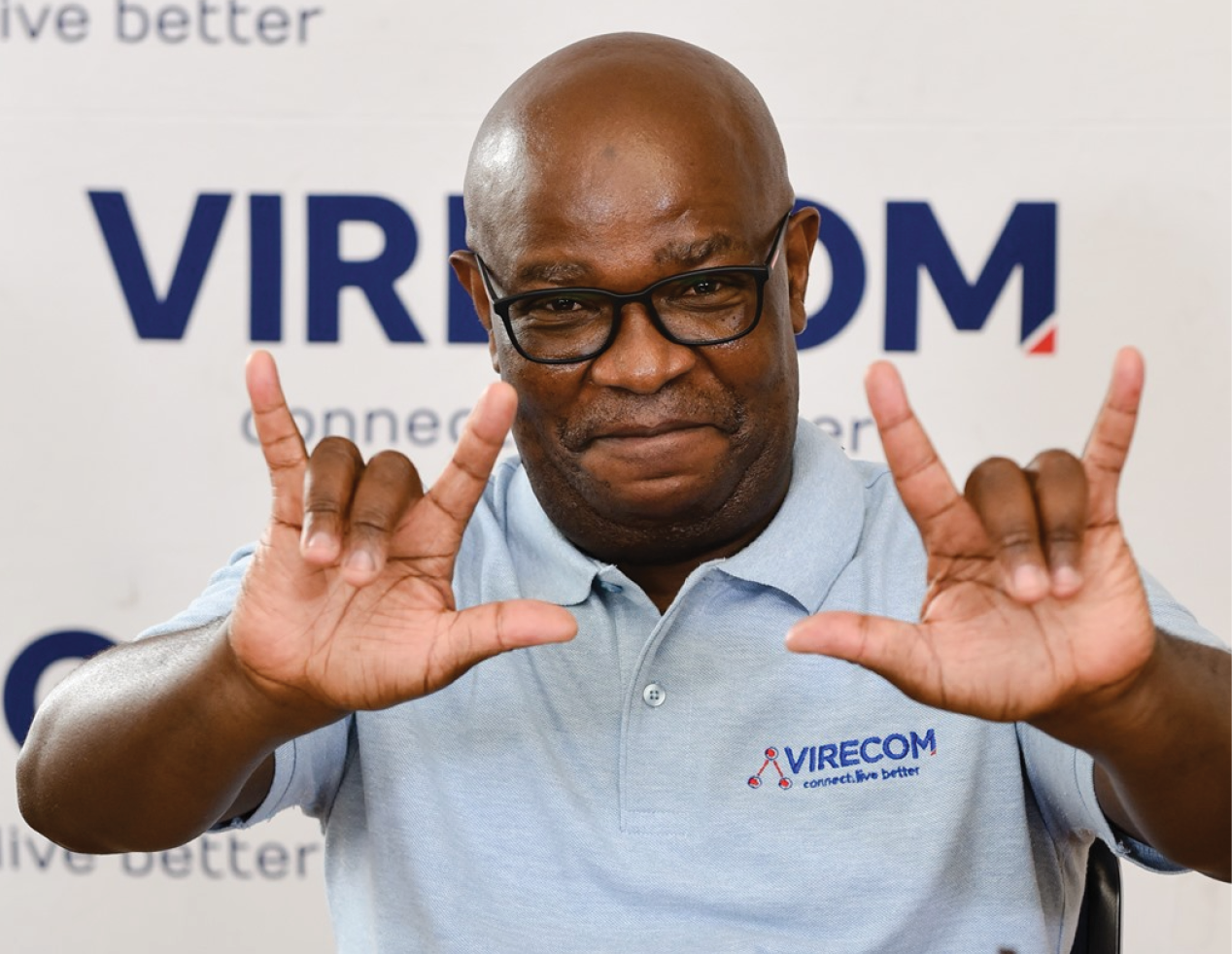When Jabulane Blose  founded Virecom in 2015, he had a clear vision: a South Africa where Deaf individuals could communicate freely and confidently without being hindered by the lack of interpreters. His journey began during his university years, where he personally experienced what he called “complete exclusion from lectures and classroom participation”. These experiences inspired him to create a solution that would ensure no Deaf person was ever excluded from essential communication.
founded Virecom in 2015, he had a clear vision: a South Africa where Deaf individuals could communicate freely and confidently without being hindered by the lack of interpreters. His journey began during his university years, where he personally experienced what he called “complete exclusion from lectures and classroom participation”. These experiences inspired him to create a solution that would ensure no Deaf person was ever excluded from essential communication.
“My journey with Virecom began from a deep awareness of how Deaf people in South Africa are often excluded from essential communication simply because South African Sign Language (SASL) access is still not consistently implemented across public services,” said Blose.
Through his advocacy within the Deaf community, he witnessed the consequences of communication barriers. “I saw firsthand how delays, misunderstandings, or the absence of sign language interpreters can lead to frustration, harm, and even danger,” he shared. “Virecom was born from the belief that technology can help close this communication gap by connecting Deaf people instantly to interpreters through a secure, real-time digital platform.”
Access to essential services
Before launching Virecom, Blose observed the challenges the Deaf community face in accessing essential services. “Deaf South Africans face daily barriers when accessing services in police stations, hospitals, courts, gender-based violence centres, mental health facilities and government offices,” he explained. “Interpreters are often unavailable, delayed or concentrated in urban centres, leaving rural areas completely excluded”.
He added that many Deaf citizens were often forced to rely on writing notes or family members for interpretation. “This undermines their privacy, independence, accuracy and the joy of uninterrupted conversation,” Blose explained. “This lack of SASL access leads to serious consequences such as misdiagnoses in healthcare, wrongful arrests, miscommunication in legal settings, and exclusion from justice, education and effective participation in society”.
Blose highlighted that Virecom’s Video Remote Interpreting (VRI) system was a game-changer in bridging communication gaps for Deaf individuals. He explained that the platform allows Deaf users and service providers to connect with professional SASL interpreters in real-time through a secure, video-based service. This technology ensures that when a Deaf person enters a police station, hospital or any service point, staff can immediately link them to an interpreter via the Virecom app. An interpreter then facilitates the conversation in both SASL and spoken language, ensuring accurate, efficient and confidential communication.
A welcome innovation
The response to Virecom has been overwhelmingly positive. “We successfully piloted Virecom in five South African Police Service (SAPS) stations in Gauteng – Orange Farm, Moroka, Johannesburg Central, Thembisa and Brooklyn – and refined the system based on user feedback,” Blose said. “Government departments recognised its potential to improve accessibility and compliance, while the Deaf community embraced it as a practical solution that promotes autonomy and dignity.”
The system’s impact was further recognised nationally, with the company receiving prestigious accolades, including the Presidential SMME Award in 2023 and second place at the Grassroots Innovation Awards in 2024.
To maintain confidentiality and reliability, Virecom ensures that its system only connects users with vetted, experienced SASL interpreters who adhere to a strict professional code of ethics and confidentiality standards. Additionally, all sessions are conducted through a secure digital platform with end-to-end encryption, ensuring privacy and security.
“We also provide continuous interpreter training and quality monitoring, while our tech infrastructure ensures stable, high-quality video connections — even in remote areas,” added Bloss.
He went on to explain that technology like Virecom plays a crucial role in making public services more inclusive, while also ensuring that service providers comply with policies and legislation aimed at promoting equality and inclusivity for people living with disabilities.
Overcoming challenges
While the journey was not without its challenges, particularly in securing funding and navigating procurement processes, Blose remained steadfast in his commitment. Accessibility is still viewed as a ‘compliance cost’ rather than a critical service,” he said. “As a Deaf-owned startup, we have also had to overcome misconceptions about capability and scalability. Yet, each challenge has strengthened our resolve to prove that inclusion and innovation can go hand in hand”.
Looking ahead, Virecom plans to expand nationally. “We are preparing for a national scale-up to include more government departments, healthcare facilities and educational institutions,” said Blose. “Plans include integrating data analytics and accessibility reporting tools to help institutions monitor compliance and plan resources better”.
His message to young innovators was one of purpose and empathy. “My message is simple: build what matters. Technology should serve not only profit but people, especially those who are often marginalised,” he said. “Innovation is most powerful when it creates access, dignity, equality and convenience – guided by the belief that no one needs to earn the right to be human”.
Contact Jabulane Blose Founder / Chief Executive Officer @VIRECOM via
Landline: +27 (12) 343 0661
Mobile: +27 82 572 0947
Web: www.virecom.co.za
Email: jabu.blose@virecom.co.za



 Facebook
Facebook Twitter
Twitter WhatsApp
WhatsApp